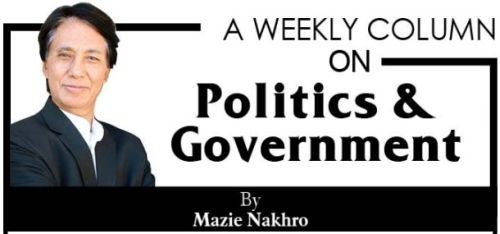
Politics in Nagaland is like an alcohol addiction. It gets even those who can’t walk straight on their own to run for public office. All one has to have is enough money to play the election game.
In gambling, a participant thinks only about winning by beating other competitors by hook or by crook. In one ofmy Village Council meetings, someone recently said: “If you’re thinking about getting into the election, you must be willing to do anything in order to win, if not … you will cause a huge loss to our village people.”What he was implying, I guess, was this: If others use money to buy votes or deploy muscle power, we have to use more of them to beat the other candidates. Sadly, this has become the prevailing mindset of our Naga people.
Having been fed with the money-for-vote mindset, many intending candidates are pressured into borrowing money or selling off their properties to contest in elections. Of course, they are betting against hope that they will recover their election campaign expenses once they get elected. They think that they have a right to be paid back, even if that meant having to steal public funds. Getting into politics, they assume, is the quickest way to make easy money.Their ideas of and motivation for politics are more in terms of gambling, not public service.
In contrast, real politics is about public service. It’s about having concern for others and serving to make lives better for all. When, for example, an elected official helps to provide good education for children, he is fulfilling his duty as a politician. And that’s not something to be construed as a gamble,because the future of our children depends on it.But when he drifts away from doing what he should do and begins to loot government funds meant for school children, he is putting the future of the children on the line or jeopardizing their lives. Therefore, real politics is not a gamble for money; it’s about dealing with real lives … and that’s a veryserious matter.
What about the recent discovery of the PDS rice scam in which the government is suspected of having a direct involvement? Can a government activity which has allegedly siphoned off supply goods meant for the poor be considered as fitting the definition of politics? Of course, not! The real name for this kind of activity is called criminal enterprise. And those who participate in that sort of illegal activity are really thieves or criminals, although they may still operate under the cover of some political offices. Such people don’t deserve to be called real politicians; at best, they are just political hacks!
Understandably, most Nagas today suspect politicians of being ambitious, conniving, unprincipled, opportunistic, and corrupt. Since we are too familiar with these sorts of leaders, we have also wrongly come to demean an honorable and essential profession – that of the politician.
Since a politician’s primary job is public service, the taskis very much a sacred profession and of a high calling which not just ‘anybody’ can fulfill. A person of political material must possesscertain exceptional abilities,such as being skillful at mediating among political factions to reach agreements, negotiating issues with various pressure groups, anddetermining trade-offs in order to achieve something that seems reasonable. In a democratic society, he must not get too far ahead of the people either, because they must talk back and forth, shifting in response to changing group pressures.
Politicians are essential for running the government, whose fragmented powers require them to make compromises among and within the various branches of government, to produce policy and action. And although he may be guided by principle, he acknowledges that there are people of principle on the other side, too.
To sum it all up, politics isn’t a game. Don’t waste it by playing games. If you dirty the office with misdeeds for short-term gains, the dirt stays behind when you leave or people will have to continue living in the dirt if you stay on as you are. Serving in government is a public trust. It’s about improving people’s lives and building a better future for all. So, treat it with the respect it deserves.





